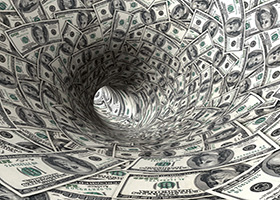

The result? “The residents of the US pay relatively low interest on their liabilities to foreigners, while earning relatively high returns on their foreign assets. This positive ‘excess return’ on net foreign assets – known as the ‘exorbitant privilege’ of issuing an international currency – facilitates the sustainability of large negative external positions,” notes Maurizio Michael Habib, an economist at European Central Bank.
There’s a disparity here. Some have cited the greenback’s role as a backstop: its safety allows for investors to borrow at low interest rates to finance risky ventures overseas. But the U.S. is not the world’s only financial centre. Swiss francs and Japanese yen are also invested abroad, and there is a positive flow of dividends and interest back. But once capital gains are added, the U.S. has an enormous advantage. Does it defy the laws of (financial) gravity?
“Yes, the US privilege is exorbitant,” Habib explains. “While a few international currencies have strong performance in their yields from the investment income balance (dividends, interest payments and so on), their total returns, including capital gains, perform less well.”
Is the privilege justified? Does the dollar gear off greater risk-taking, so that bigger capital gains are bought through higher leverage?
“In general, no, the US asset-liability structure does not explain excess returns (even though country risk partly matters),” he concludes.
More American exceptionalism (for the history buffs).
